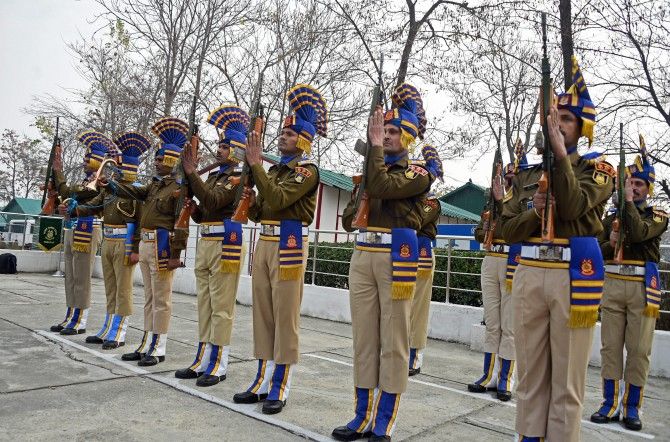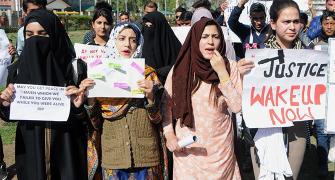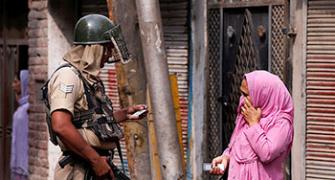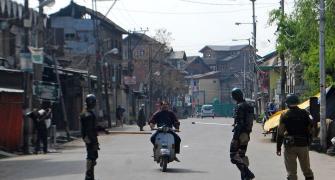'We should give azaadi to Jammu and Ladakh from the domination of Kashmir valley politics,' suggests Colonel Anil A Athale (retd).

Prasad was killed in a terrorist attack at Kakapora in Pulwama district, South Kashmir, the previous night. Photograph: S Irfan/PTI Photo
- Part 1 of the series: Kashmir poses no threat to India's security
- Part 2: Kashmir problem: It's the environment, stupid!
The crux of the problem in the Kashmir valley is that some of the contesting parties are idealists and crave for a 'maximalist' solution.
Let us take Pakistan first. It has inserted itself in the Kashmir issue on the basis of the Nehruvian blunder (of offering to take the issue to the United Nations) and unrest in the valley.
Pakistan does not claim the valley alone, it wants the whole of Jammu and Kashmir, that includes Jammu and Ladakh, where there is zero support for secession.
The Kashmiris similarly want the whole of J&K to either merge with Pakistan, become independent or part of the Islamic caliphate (the latest fad).
It is only India that has a less than maximalist position de facto. Though de jure it claims the whole of the erstwhile state of J&K including Pakistan occupied Kashmir, Gilgit and Hunza.
From a realistic perspective emerges a pragmatic strategy.
The reality is that whatever the level of violence and disaffection in the valley, India has an iron grip over Kashmir.
Pakistan lacks the military strength to take it by force, and even a proxy war. The Indian armed forces are capable of continuing in Kashmir indefinitely.
The only way for Pakistan and the Kashmiris to attain their objective is if they can get popular support for their cause in India.
Remember, America did not lose the Vietnam War on the battlefield, but in American drawing rooms where television images of the horror led to loss of popular support.
At this moment and for the foreseeable future, one does not see Indian popular support wavering.
Forget winning over Indians, let the separatists in the valley and their masters in Pakistan at least begin with gaining support in the 'other parts' of J&K.
Given this kind of interlocking stalemate, it is time India just waited it out till better sense or fatigue makes the Kashmir valley amenable to peace within India.
Till then India should concentrate on the peaceful areas of J&K for economic development and leave the valley alone to stew in its own juice.
The thinking people in the Kashmir valley must ponder over the fact that the 'stone-pelting' model they have adopted from the Middle East is essentially a failed method. On the other hand, more pragmatic West Bank Palestinians are relatively peaceful.
India has many times offered full autonomy within the Union but has always been spurned by the separatists. It is time for India to take the bold step of withdrawing our complaint from the UN and start treating the Kashmir issue as an internal problem of India.
Once we are out of the UN's constraints, we should also look at trifurcation of J&K and give azaadi to Jammu and Ladakh from the domination of valley politics.
Till the time better sense prevails in the valley, India must hold fast, reduce violence and wait out the Kashmiris.
Colonel Anil A Athale (retd) -- a military historian specialising in counter-insurgency -- is a long-time Kashmir watcher. He is the author of Let the Jhelum Smile Again.









